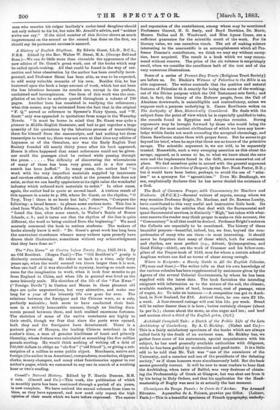A History of English Rhythms. By Edwin Guest, LL.D., D.C.L.,
F.H.B. Edited by the Rev. Walter W. Skeet, M.A. (George Bell and Sons.)—We can do little more than chronicle the appearance of the new edition of Dr. Guest's great work, one of the books which may be called epoch-making. All that could be found in the way of cor- rection and later observation by the author has been carefully incor- porated, and Professor Skeet has been able, as was to be expected, to add many valuable remarks of his own. Besides this, he has bestowed upon the book a large amount of work, which has not been the less laborious because its results are, except in the preface, unclaimed and inconspicuous. One item of this work was the com- pilation of an index to authors quoted throughout a volume of 700 pages. Another item has consisted in verifying the references ; what this means, may be estimated from the fact that in the original "F. Q." served as reference to Spenser's Fairy Queen, and " W. Scott" only was appended to quotations from songs in the Waverley Novels. "It must be borne in mind that Dr. Guest was quite a pioneer in Middle-English literature, and had to get together a large quantity of his quotations by the laborious process of transcribing them for himself from the manuscripts, and had nothing but these transcripts to trust to; there was not even at that time any edition of Layamon or of the Ormulum, nor was the Early English Text Society founded till nearly thirty years after his book appeared, Hence it often happened that exact references could not be given. nor could the passages cited be revised while passing through
the press The difficulty of discovering the whereabouts of niftily of these has been very great, and in a few cases search has been _baffled." In many cases, the author had " to work with the very imperfect materials supplied by inaccurate and careless editions, a difficulty which at the present date does not exist, so that we can hardly appreciate at its right value the wonderful industry which reduced such materials to order." In other cases, again, the author bad to quote at second-hand. A curious result of this appears in a note to p. 283, where Dr. Guest, on the rhythm, "O Troy, Troy ! there is no boote but bale," observes, "Compare the following.: a broad bream : to please some curious taste. This line is cited from Waller, in Todd's Johnson, s.v. Bream." Professor Skeet "found the line, after some search, in Waller's Battle of Somer Islands, o. 3 ; and it turns out that the rhythm of the line is quite different, the word as being omitted from the beginning." We need scarcely commend the book to serious students. The makers of books already know it well : " Dr. Guest's great work has long been the convenient storehouse whence many writers upon prosody have drawn their illustrations, sometimes without any acknowledgment that they have done so."


































 Previous page
Previous page